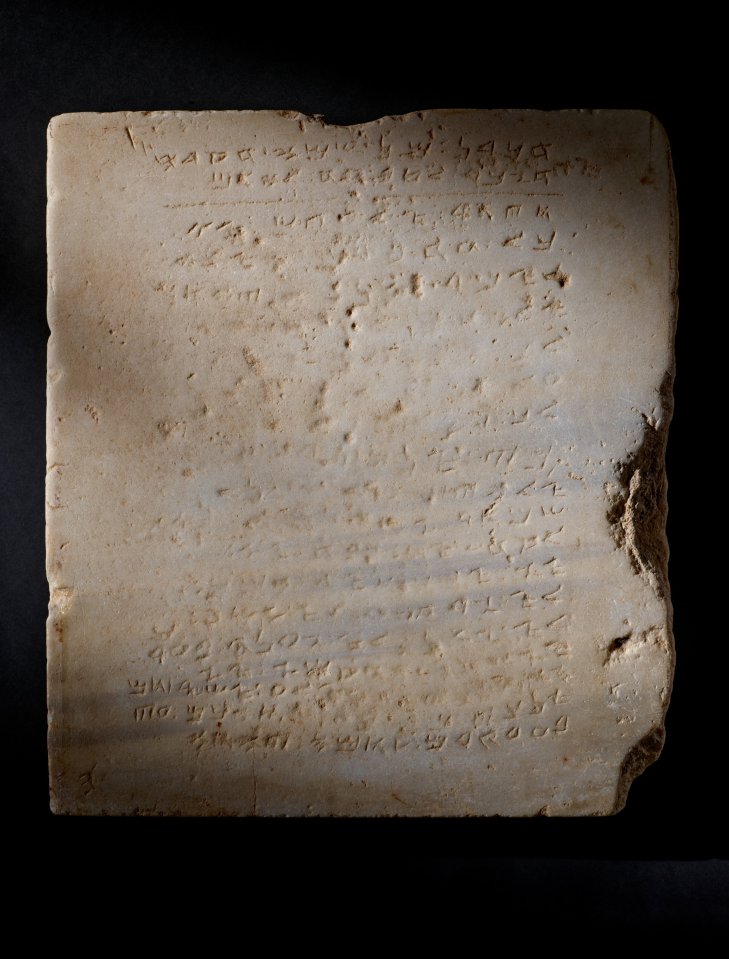Oldest stone tablet of Bible’s 10 Commandments discovered after being used as a PAVING STONE set to fetch $2m at auction
THE oldest stone tablet known to hold the inscription of the Ten Commandments is set to fetch up to $2 million after being used as a paving slab.
At around 1,500 years old, the marble slab was found in Israel in 1913 but was trodden on for decades after that.
After being found during excavation for a railway line, the Late Roman-Byzantine tablet was used to pave the entrance of a home for 30 years.
Weighing in at 115 pounds, the two-foot tall slab was not thought to be special until someone noticed and translated its Paleo-Hebrew inscription.
Paleo-Hebrew is no longer a commonly used writing system and with the paving stone placed face-up, it was heavily trodden on.
The inscription on the stone, which is twenty lines long, combines both Christian and Jewish traditions.
But, this tablet with the oldest known inscription of the commandments is missing one crucial element.
Only nine of the commandments from the Old Testament’s Book of Exodus are on the stone.
The third one stating “Thou shalt not take the name of the Lord in Vain” has been left off.
Instead, it directs followers to worship on Mount Gerizim, which is a holy site for the Samaritans who separated from mainstream Judaism around 3,000 years ago.
However, the two faiths observe similar religious practices and look to a similar version of the Hebrew Bible, or the Old Testament for Christians.
Now, the religious stone is set to go on auction in New York next month.
Jesus ‘proof’ DASHED as Turin Shroud ‘doesn’t show son of God’, says study
The tablet which will be sold at Sotheby’s auction house is hoped to get up to $2 million or £1.57 million.
In 1943 it was sold to an unnamed scholar who knew of its history.
Sotheby’s told CNN in a statement: “The scholar recognized it as an important Samaritan Decalogue featuring the divine precepts central to many faiths, one that may have originally been displayed in a synagogue or a private dwelling.”
Before the auction, it will be on display at the auction house’s showroom from December 5.
Southebys has described the Ten Commandments in the Book of Exodus as the “cornerstone of law and morality” and the “founding text of Western civilisation.”
ORIGINS
It is believed to have originally been part of a synagogue which was destroyed either in a Roman invasion between 400 and 600 AD or in the Crusades in the 11th Century.
When the new railway line was being dug in Israel, the slab was found near the sites of early religious buildings including mosques, synagogues, and churches.
Richard Austin, Sotheby’s global head of books and manuscripts, said in the press statement:
“This remarkable tablet is not only a vastly important historic artefact, but a tangible link to the beliefs that helped shape Western civilization.
Read More on The US Sun
“To encounter this shared piece of cultural heritage is to journey through millennia and connect with cultures and faiths told through one of humanity’s earliest and most enduring moral codes.”
The auction will take place on December 18.
Note: Thank you for visiting our website! We strive to keep you informed with the latest updates based on expected timelines, although please note that we are not affiliated with any official bodies. Our team is committed to ensuring accuracy and transparency in our reporting, verifying all information before publication. We aim to bring you reliable news, and if you have any questions or concerns about our content, feel free to reach out to us via email. We appreciate your trust and support!













